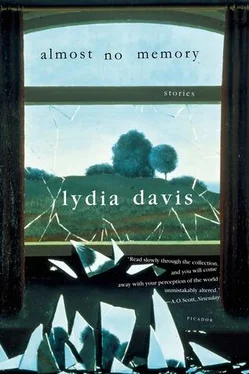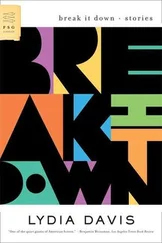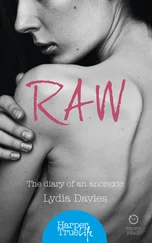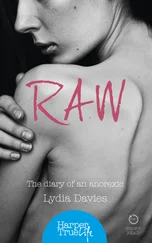Lydia Davis - Almost No Memory
Здесь есть возможность читать онлайн «Lydia Davis - Almost No Memory» весь текст электронной книги совершенно бесплатно (целиком полную версию без сокращений). В некоторых случаях можно слушать аудио, скачать через торрент в формате fb2 и присутствует краткое содержание. Год выпуска: 2001, Издательство: Farrar, Straus and Giroux, Жанр: Современная проза, на английском языке. Описание произведения, (предисловие) а так же отзывы посетителей доступны на портале библиотеки ЛибКат.
- Название:Almost No Memory
- Автор:
- Издательство:Farrar, Straus and Giroux
- Жанр:
- Год:2001
- ISBN:нет данных
- Рейтинг книги:3 / 5. Голосов: 1
-
Избранное:Добавить в избранное
- Отзывы:
-
Ваша оценка:
- 60
- 1
- 2
- 3
- 4
- 5
Almost No Memory: краткое содержание, описание и аннотация
Предлагаем к чтению аннотацию, описание, краткое содержание или предисловие (зависит от того, что написал сам автор книги «Almost No Memory»). Если вы не нашли необходимую информацию о книге — напишите в комментариях, мы постараемся отыскать её.
. In each of these stories, Davis reveals an empathic, sometimes shattering understanding of human relationships.
Almost No Memory — читать онлайн бесплатно полную книгу (весь текст) целиком
Ниже представлен текст книги, разбитый по страницам. Система сохранения места последней прочитанной страницы, позволяет с удобством читать онлайн бесплатно книгу «Almost No Memory», без необходимости каждый раз заново искать на чём Вы остановились. Поставьте закладку, и сможете в любой момент перейти на страницу, на которой закончили чтение.
Интервал:
Закладка:
Lydia Davis
Almost No Memory
MEAT, MY HUSBAND
My husband’s favorite food, in childhood, was corned beef. I found this out yesterday when friends came over and we started talking about food. At some point they asked what our favorite childhood foods had been. I couldn’t think of any, but my husband didn’t have to think before answering.
“Corned beef,” he said.
“Corned beef with an egg on it!” one of our friends added.
My husband often ate in diners before we met. He had two he liked, but he preferred the one where they did a particularly good hot roast beef sandwich. He still likes a good piece of roast beef, or steak, or hamburger mixed with sauce and spices and grilled outdoors with brochettes of onions and peppers.
But I’m the one who cooks most of his meals now. Often I make him meals with no meat in them at all because I don’t think meat is good for us. Often there is no seafood in them either, because most seafood isn’t good for us either, and there is almost never any fish in them, partly because I can’t remember which sorts of fish may be safe to eat and which are almost certainly not, but mainly because he likes fish only when it’s served in a restaurant or cooked in such a way that he can’t tell it’s fish. Often there is no cheese in our meals either, because of the problem with fat. I’ll make him a brown-rice casserole, for example, or winter vegetables with parsley sauce, or turnip soup with turnip greens, or white bean and eggplant gratin, or polenta with spicy vegetables.
“Why don’t you make the foods I like?” he asks sometimes.
“Why don’t you like the foods I make?” I answer.
Once I marinated slabs of tofu in tamari sauce, champagne vinegar, red wine, toasted marjoram, and dried Chinese mushrooms simmered in water. I marinated them for four or five days and then served them to him, sliced thin, in a sandwich with horseradish and mayonnaise, slices of red onion, lettuce and tomato. First he said the tofu was still very bland, which is what he always says about tofu, then he said that on the other hand, if he hadn’t known it was there, he wouldn’t have been able to taste the tofu anyway because there were so many other things in the sandwich. He said it was all right, and then he said he knew tofu was good for him.
Sometimes he likes what I make, and if he’s in a good mood he says so. Once I made him a cucumber salad with feta cheese and red onion and he liked it, saying it tasted Greek. Another time I made him a lentil salad with peppers and mint and he liked that, too, though he said it tasted like dirt.
But generally he doesn’t like what I cook as much as what he used to eat in diners and certainly not as much as what he used to make for himself before he met me.
For instance, he used to make a roulade of beef cooked in a Marsala sauce. He would take thin slices of top round or sirloin, dust them with flour, coat one side with crushed dill seeds, roll them around cooked Italian sausage meat, and pierce them with a toothpick. Then he would sauté them in butter and simmer them in a brown Marsala sauce with mushrooms. He would also make roulades of veal stuffed with prosciutto and Gruyère. Another favorite was a meatloaf of veal, pork, and sirloin. It would contain garlic, rosemary, two eggs, and whole-wheat bread crumbs. He would lay smoked bacon underneath it and on top of it.
Now the loaf I make for him is of ground turkey. It, too, has mushrooms, fresh whole-wheat bread crumbs and garlic in it, but in other ways it is not the same. I make it with one egg, celery, leeks, sweet red peppers, salt and pepper, and a dash of nutmeg.
Outdoors on the deck, he eats it and says nothing, gazing over the water past the willow tree. He is calm and contemplative. I don’t think he’s calm because I’m feeding him so much less meat, but because he is teaching himself to accept what I do. He doesn’t like it but knows that I believe I’m doing it for his own good.
When he says nothing about the turkey loaf, I question him, and when I press him to answer, he says that it’s all right but he’s not excited about it. He excuses himself by saying that in general he’s not very excited about food. I disagree, because I have seen him excited about food, though almost never about what I serve him. In fact, I can remember only one occasion on which he was excited by what I served him.
It was the night I made polenta and spicy vegetables for our dinner, though that was not what excited him. The polenta, spreading in a thick ocher circle under the heap of reddish-brown vegetables, looked strange and reminded us both of a cow patty. When he had eaten some of it, though, my husband said it tasted better than it looked, something he has said before about other meals of mine. The cookbook had suggested a certain dessert to follow: a ripe pear, chilled, with walnuts. As we sat down to our meal, I told my husband what I was planning for dessert, though I was not going to bother chilling the pear.
That’s one of my problems as a cook — that I don’t bother to do each thing the way it should be done. I don’t seem to understand the importance of detail, in cooking. My husband does, and when I told him my plan for dessert, he got right up from the table and put the pear in the freezer to chill.
When we came to eat the pear and the walnuts, the contrast between the cool, juicy sweetness of the fruit and the warmer, oily fragrance of the nuts certainly excited my husband, enough for him to imagine other desserts of fruit — poached figs with ginger, apricot fritters, and sliced blood oranges with pecans. Certainly he was more excited about this dessert than he had been about anything else I had served him. But then he was the one who had put the pear in the freezer, and I’ve learned by now that when he’s involved in preparing a meal, or anything else for that matter, he’s more apt to like it.
JACK IN THE COUNTRY
Henry encounters Jack on the street and asks how his weekend with Laura was. Jack says he hasn’t spoken to Laura in at least a month. Henry is angry. He thinks Ellen has been lying to him about Laura. Ellen says she has been telling the truth: Laura told her over the phone that Jack was coming for the weekend to her house up there in the country. Henry is still angry, but now he is angry because he thinks Laura was lying to Ellen when she told her Jack was coming up for the weekend. At this point, with embarrassment, Ellen realizes her mistake: more than one Jack is involved here. Laura said only that Jack was coming to visit her for the weekend, and it was not the Jack that Ellen and Henry know but the Jack that only Ellen knows, and only slightly, who was about to arrive at Laura’s house in the country. With some misgiving, she explains this to Henry. Now Henry is even angrier than before, but he is angry because Laura has been seeing a Jack he does not know instead of the Jack he knows. He is angry because the Jack he knows is an old friend of Laura’s, whereas the Jack he does not know must be a new lover. Henry declares he will not speak to Laura again except to ask her to send back his keys. He will take her name out of his address book and refuse to hear any further mention of her from Ellen or the Jack he knows. Henry cannot know, since he will not speak to Laura, that in fact a third Jack has become involved in this story, to the distress of the second Jack, for Laura’s affections have already strayed from the Jack that Ellen knows only slightly and that Henry does not know, and fastened on a Jack in the country unknown to them all.
FOUCAULT AND PENCIL
Sat down to read Foucault with pencil in hand. Knocked over glass of water onto waiting-room floor.
Читать дальшеИнтервал:
Закладка:
Похожие книги на «Almost No Memory»
Представляем Вашему вниманию похожие книги на «Almost No Memory» списком для выбора. Мы отобрали схожую по названию и смыслу литературу в надежде предоставить читателям больше вариантов отыскать новые, интересные, ещё непрочитанные произведения.
Обсуждение, отзывы о книге «Almost No Memory» и просто собственные мнения читателей. Оставьте ваши комментарии, напишите, что Вы думаете о произведении, его смысле или главных героях. Укажите что конкретно понравилось, а что нет, и почему Вы так считаете.












